高二英语必修五第四单元知识点总结
- 格式:doc
- 大小:36.00 KB
- 文档页数:7
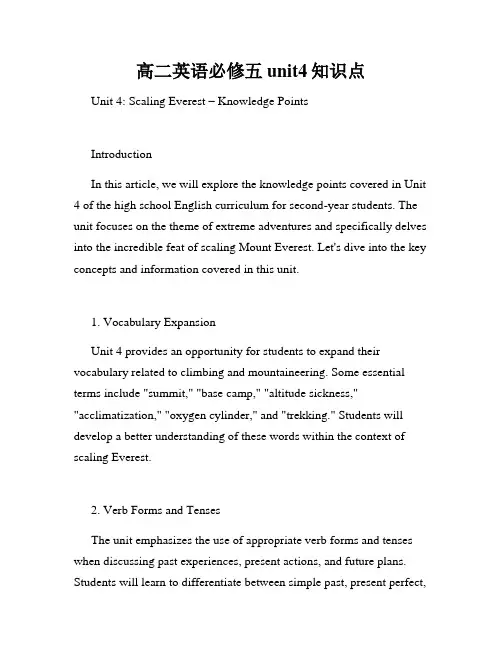
高二英语必修五unit4知识点Unit 4: Scaling Everest – Knowledge PointsIntroductionIn this article, we will explore the knowledge points covered in Unit 4 of the high school English curriculum for second-year students. The unit focuses on the theme of extreme adventures and specifically delves into the incredible feat of scaling Mount Everest. Let's dive into the key concepts and information covered in this unit.1. Vocabulary ExpansionUnit 4 provides an opportunity for students to expand their vocabulary related to climbing and mountaineering. Some essential terms include "summit," "base camp," "altitude sickness," "acclimatization," "oxygen cylinder," and "trekking." Students will develop a better understanding of these words within the context of scaling Everest.2. Verb Forms and TensesThe unit emphasizes the use of appropriate verb forms and tenses when discussing past experiences, present actions, and future plans. Students will learn to differentiate between simple past, present perfect,and future tenses and utilize them effectively in their speaking and writing.3. Reading ComprehensionUnit 4 incorporates various reading passages related to Everest, allowing students to enhance their reading comprehension skills. By using context clues, students will strengthen their ability to understand unfamiliar words and phrases encountered in the texts. Additionally, they will learn how to identify main ideas, supporting details, and draw inferences from the given information.4. Listening SkillsListening activities in this unit aim to improve students' ability to understand spoken English in different contexts. By hearing dialogues and conversations related to mountain climbing, students will develop their listening skills and gain exposure to a range of accents and speech patterns.5. Writing PracticeUnit 4 offers opportunities for students to engage in descriptive and narrative writing exercises. They will learn to effectively describe a scene or sequence of events, incorporating diverse vocabulary,appropriate adjectives, and adverbs to enhance their writing style. Furthermore, students will focus on improving coherence and cohesion in their written work.6. Grammar Focus: ModalsThe unit introduces various modal verbs, such as "can," "must," and "should," and explores their usage in different contexts. Students will learn how to express ability, necessity, obligation, and make suggestions using these modals.7. Cultural AwarenessBeyond linguistic knowledge, Unit 4 also promotes cultural understanding. Students will be exposed to the unique Sherpa culture and their indispensable role in the Everest climbing industry. They will gain insights into the challenges faced by Sherpas and learn to appreciate the cultural significance of Mount Everest as an iconic symbol of human achievement.ConclusionUnit 4 of the high school English curriculum covers a range of knowledge points related to scaling Mount Everest. By expanding their vocabulary, understanding verb forms, enhancing reading and listeningskills, practicing writing, and developing cultural awareness, students will gain a comprehensive understanding of this extreme adventure. Through this unit, students will not only improve their English language proficiency but also broaden their horizons and gain a deeper appreciation for the world beyond their immediate surroundings.。
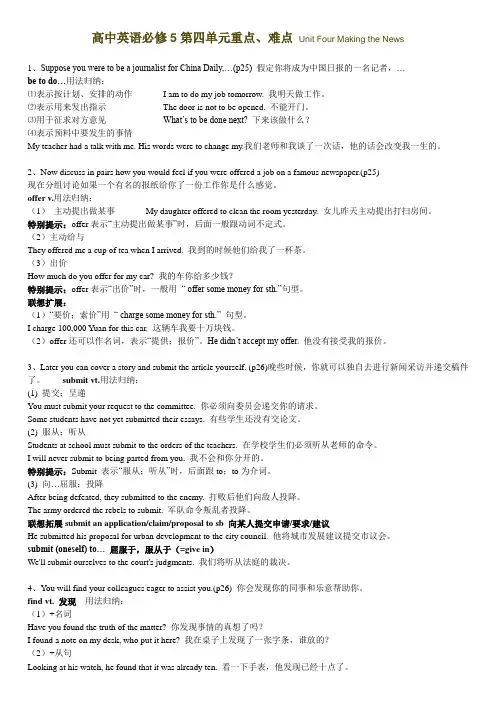
高中英语必修5第四单元重点、难点Unit Four Making the News1、Suppose you were to be a journalist for China Daily,…(p25) 假定你将成为中国日报的一名记者,…be to do…用法归纳:⑴表示按计划、安排的动作I am to do my job tomorrow. 我明天做工作。
⑵表示用来发出指示The door is not to be opened. 不能开门。
⑶用于征求对方意见What’s to be done next? 下来该做什么?⑷表示预料中要发生的事情My teacher had a talk with me. His words were to change my.我们老师和我谈了一次话,他的话会改变我一生的。
2、Now discuss in pairs how you would feel if you were offered a job on a famous newspaper.(p25)现在分组讨论如果一个有名的报纸给你了一份工作你是什么感觉。
offer v.用法归纳:(1)主动提出做某事My daughter offered to clean the room yesterday. 女儿昨天主动提出打扫房间。
特别提示:offer表示“主动提出做某事”时,后面一般跟动词不定式。
(2)主动给与They offered me a cup of tea when I arrived. 我到的时候他们给我了一杯茶。
(3)出价How much do you offer for my car? 我的车你给多少钱?特别提示:offer表示“出价”时,一般用“ offer some money for sth.”句型。
联想扩展:(1)“要价;索价”用“ charge some money for sth.” 句型。

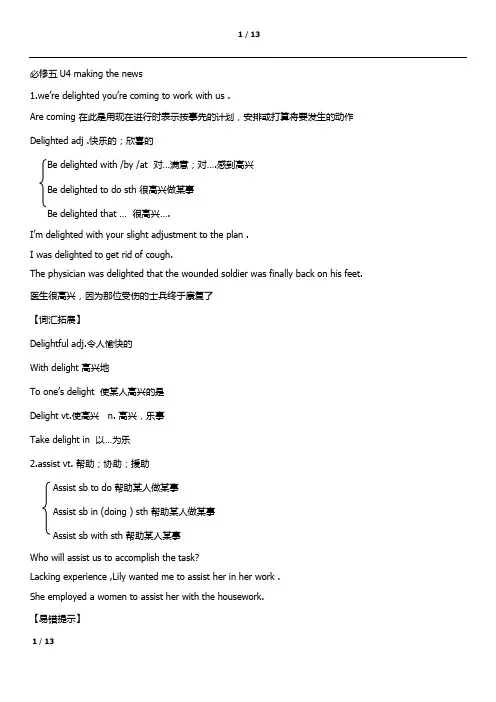
必修五U4 making the news1.we’re delighted you’re coming to work with us .Are coming 在此是用现在进行时表示按事先的计划,安排或打算将要发生的动作Delighted adj .快乐的;欣喜的Be delighted with /by /at 对…满意;对….感到高兴Be delighted to do sth 很高兴做某事Be delighted that …很高兴….I’m delighted with your slight adjustment to the plan .I was delighted to get rid of cough.The physician was delighted that the wounded soldier was finally back on his feet. 医生很高兴,因为那位受伤的士兵终于康复了【词汇拓展】Delightful adj.令人愉快的With delight 高兴地To one’s delight 使某人高兴的是Delight vt.使高兴 n. 高兴,乐事Take delight in 以…为乐2.assist vt. 帮助;协助;援助Assist sb to do 帮助某人做某事Assist sb in (doing ) sth 帮助某人做某事Assist sb with sth 帮助某人某事Who will assist us to accomplish the task?Lacking experience ,Lily wanted me to assist her in her work .She employed a women to assist her with the housework.【易错提示】Assist 强调在提供帮助时,以受助者为主,所给的帮助起辅助性的作用。
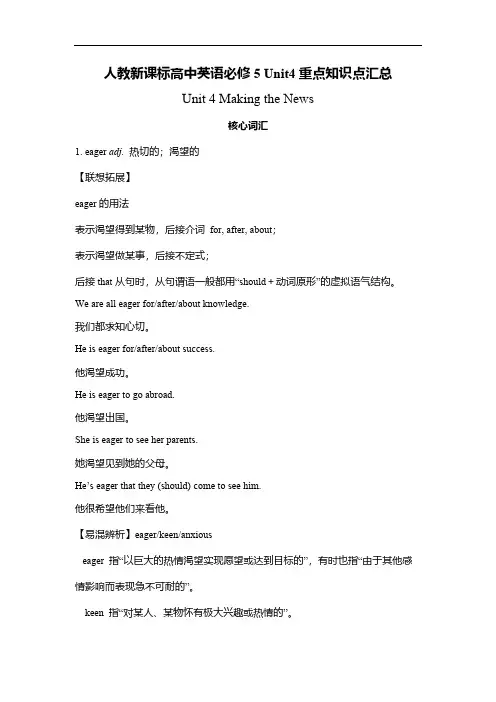
人教新课标高中英语必修5 Unit4重点知识点汇总Unit 4 Making the News核心词汇1. eager adj.热切的;渴望的【联想拓展】eager的用法表示渴望得到某物,后接介词for, after, about;表示渴望做某事,后接不定式;后接that从句时,从句谓语一般都用“should+动词原形”的虚拟语气结构。
We are all eager for/after/about knowledge.我们都求知心切。
He is eager for/after/about success.他渴望成功。
He is eager to go abroad.他渴望出国。
She is eager to see her parents.她渴望见到她的父母。
He’s eager that they (should) come to see him.他很希望他们来看他。
【易混辨析】eager/keen/anxiouseager 指“以巨大的热情渴望实现愿望或达到目标的”,有时也指“由于其他感情影响而表现急不可耐的”。
keen 指“对某人、某物怀有极大兴趣或热情的”。
anxious 指“热切地希望实现愿望,并因顾虑愿望落空而心情不安,感到焦虑的”。
2. meanwhile adv.此时;同时;其间n.同时(=meantime)meanwhile意为“同时,在此期间”,作为副词和名词,表示在某动作或情况发生或存在期间将可能发生另一件事。
它不用于说明人或事物的另一面。
【常用结构】in the meanwhile = in the meantime 在此期间They’ll be here soon. Meanwhile we’ll have some coffee.他们即刻就到,我们现在先喝点咖啡。
Meanwhile, my tongue was busy searching out the hole where the tooth had been.与此同时,我的舌头正忙于寻找被拔牙齿的伤口。
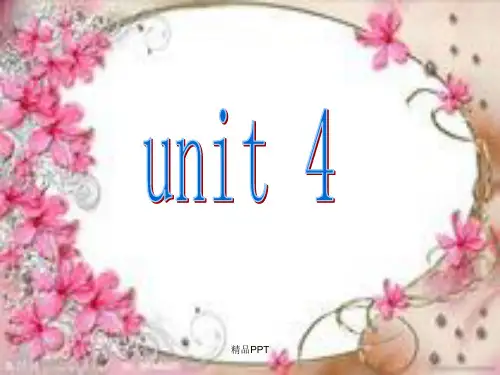
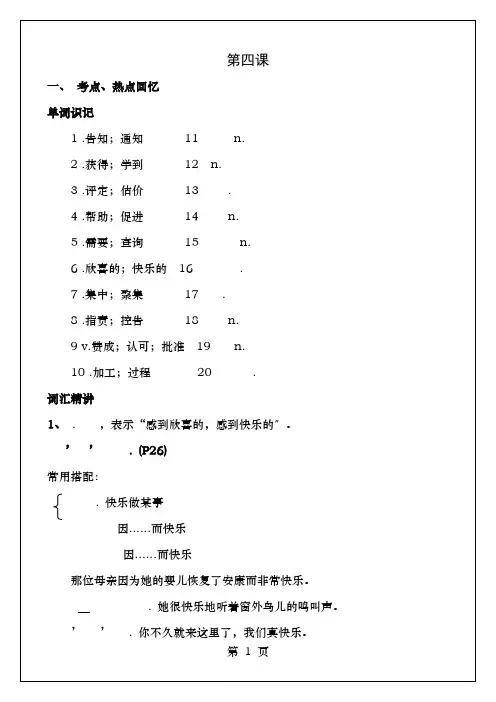
【拓展】 . 表示“使〔某人〕快乐,使〔某人〕欣喜〞。
n. 快乐,快乐,使人快乐的人或事。
. , 令人愉悦的常用短语:() . 喜爱,以......为乐’s 令人快乐的是快乐地如: . 他幽默的语言让观众们很快乐。
a . 杰克是个讨人喜欢的年轻人。
. 卡尔以取笑他的同学为乐。
使她所有粉丝快乐的是,她很容易地赢得了比赛。
, . 听见下课了,男孩们快乐地冲出来教室。
【随时练】, (芭蕾舞会).A. B. C. D.【答案与解析】A。
因为某事而快乐;表示人或事物的性质,意为“令人愉悦的〞;〔感到〕惊悸的;可怕的。
2、 . ,表示“集中〔注意力、思想等〕〞常与介词连用,也表示“使......集中于一点〞,常用于被动语态。
’ . (P26):A . 司机驾驶时应该专心于路况。
【拓展】 . 表示“集中的〞只能作定语;n. 表示“专心,聚集〞走神A. B. C. D.【答案与解析】B。
对......感到满足;对......感到骄傲;渴望;对......感到担忧。
4、 ., . . 表示“帮助;支援〞。
’ , ... (P26)常用短语:帮助某人做某事〔.〕 . 或. 我们都帮助修屋顶。
a .这个节目帮助年轻人容易找到工作。
【拓展】n. 表示“助手,助理〞;n. 表示“协助,援助〞,常用短语: . 帮助某人: . 从技术学校毕业后他成了厨师助理。
I ? 我可以帮助你吗?【随时练】A. B. C. D.【答案与解析】C。
. 帮助某人做某事;提供,常用 . ;供给,常用 . ;维持,养活。
5、 . . , 表示“获得,取得;学得〞。
. (P26)a() 得到……知识,精通: a .我们必须用功学习才能精通英语。
. 抽烟喝酒往往是一种后来习得的嗜好,并不是生来就有的。
【拓展】n. 获得;〔语言〕习得;获得物这位教师对儿童语言学习的理论感兴趣。
【随时练】A. B. C. D.【答案与解析】B。
句意:一些人返回学校想获取另一个文凭来增强社会地位。

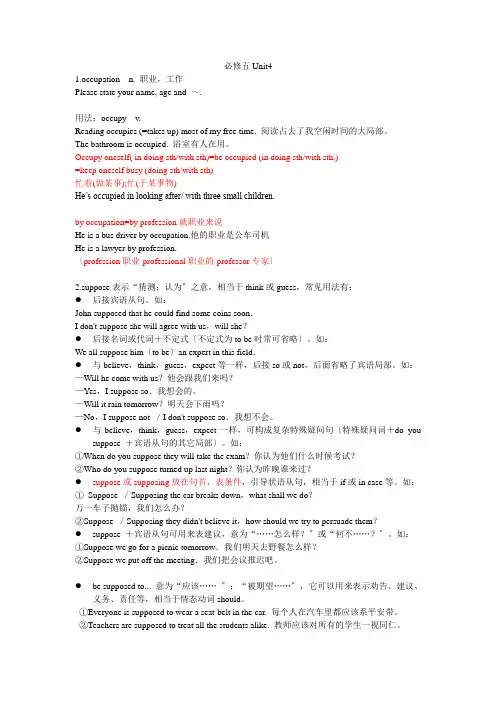
必修五Unit41.occupation n. 职业,工作Please state your name, age and ~.用法:occupy v.Reading occupies (=takes up) most of my free time. 阅读占去了我空闲时间的大局部。
The bathroom is occupied. 浴室有人在用。
Occupy oneself( in doing sth/with sth)=be occupied (in doing sth/with sth.)=keep oneself busy (doing sth/with sth)忙着(做某事);忙(于某事物)He’s occupied in looking after/ with three small children.by occupation=by profession就职业来说He is a bus driver by occupation.他的职业是公车司机He is a lawyer by profession.〔profession职业-professional职业的-professor专家〕2.suppose表示“猜测;认为〞之意,相当于think或guess,常见用法有:●后接宾语从句。
如:John supposed that he could find some coins soon.I don't suppose she will agree with us,will she?●后接名词或代词+不定式〔不定式为to be时常可省略〕。
如:We all suppose him〔to be〕an expert in this field.●与believe,think,guess,expect等一样,后接so或not,后面省略了宾语局部。
如:—Will he come with us?他会跟我们来吗?—Yes,I suppose so.我想会的。
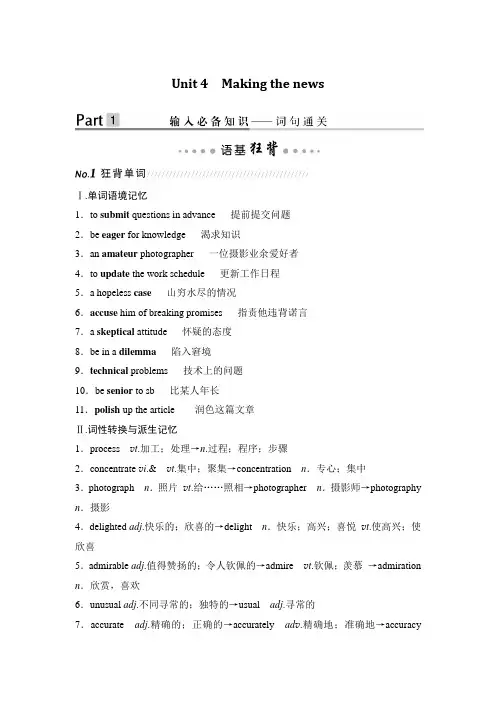
Unit 4Making the newsⅠ.单词语境记忆1.to submit questions in advance 提前提交问题2.be eager for knowledge 渴求知识3.an amateur photographer 一位摄影业余爱好者4.to update the work schedule 更新工作日程5.a hopeless case山穷水尽的情况6.accuse him of breaking promises 指责他违背诺言7.a skeptical attitude 怀疑的态度8.be in a dilemma陷入窘境9.technical problems 技术上的问题10.be senior to sb 比某人年长11.polish up the article 润色这篇文章Ⅱ.词性转换与派生记忆1.process v t.加工;处理→n.过程;程序;步骤2.concentrate v i.& v t.集中;聚集→concentration n.专心;集中3.photograph n.照片v t.给……照相→photographer n.摄影师→photography n.摄影4.delighted adj.快乐的;欣喜的→delight n.快乐;高兴;喜悦v t.使高兴;使欣喜5.admirable adj.值得赞扬的;令人钦佩的→admire v t.钦佩;羡慕→admiration n.欣赏,喜欢6.unusual adj.不同寻常的;独特的→usual adj.寻常的7.accurate adj.精确的;正确的→accurately ad v.精确地;准确地→accuracyn.精确度;准确性8.approve v t.赞成;认可;批准→approval n.赞成;同意;批准;通过→disapproval n.不赞成;反对9.appointment n.约会;任命→appoint v t.约定;任命10.assess v t.评估;评定→assessment n.评定;估定11.assist v t.帮助;协助;援助→assistance n.帮助;协助→assistant n.助手;助理;售货员12.profession n.职业;专业→professional adj.专业的;职业的n.专业人员13.guilty adj.犯罪的;有罪的;内疚的→guilt n.内疚;犯罪;有罪14.acquire v t.获得;取得;学到→acquirement n.取得,习得15.gift n.天赋;礼物→gifted adj.有天赋的16.inform v t.告知;通知→information n.信息Ⅲ.单词趣味串记1.The chief chef is busy cooking for the chief from an African country.主厨忙于为来自于一个非洲国家的首领烹饪。
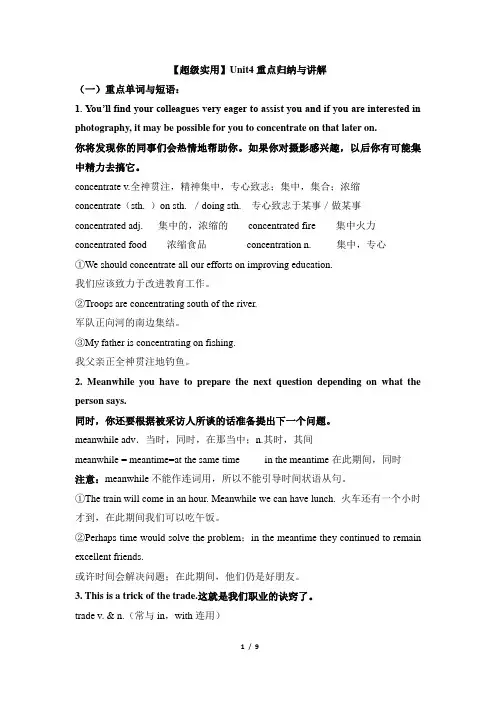
【超级实用】Unit4重点归纳与讲解(一)重点单词与短语:1. You’ll find your colleagues very eager to assist you and if you are interested in photography, it may be possible for you to concentrate on that later on.你将发现你的同事们会热情地帮助你。
如果你对摄影感兴趣,以后你有可能集中精力去搞它。
concentrate v.全神贯注,精神集中,专心致志;集中,集合;浓缩concentrate(sth. )on sth. /doing sth. 专心致志于某事/做某事concentrated adj. 集中的,浓缩的concentrated fire 集中火力concentrated food 浓缩食品concentration n. 集中,专心①We should concentrate all our efforts on improving education.我们应该致力于改进教育工作。
②Troops are concentrating south of the river.军队正向河的南边集结。
③My father is concentrating on fishing.我父亲正全神贯注地钓鱼。
2. Meanwhile you have to prepare the next question depending on what the person says.同时,你还要根据被采访人所谈的话准备提出下一个问题。
meanwhile adv.当时,同时,在那当中;n.其时,其间meanwhile = meantime=at the same time in the meantime在此期间,同时注意:meanwhile不能作连词用,所以不能引导时间状语从句。
必修五英语笔记整理unit4journalist n. 新闻工作者,新闻记者;记日志者journal n. 日报,日志,日记;定期刊物,期刊,杂志;[会计]分类账involve vt. 包含;使参与,牵涉;围绕,缠绕;使专心于involvement n. 牵连,参与;加入;财政困难;牵连的事务,复杂的情况involve sb in doing 使某人参与involve oneself in doing 使自己从事......be/get involved in 参与Running your own business usually involves working long hours.经营自己的生意通常需要长时间的工作。
Parents should involve themselves in their children’s activities.父母应该参与孩子的活动。
These changes will involves everyone on the staff.这些变化将涉及到所有员工。
More than thirty software firms were involved in the project.有三十多家软件公司参与了这个项目。
editor n. 编辑,编者;校订者;[计]编辑软件,编辑程序edit vt. 编辑;剪辑(影片,录音);校订;主编n. 编辑edition n. 版次,版本;(报纸、杂志的)一份;(广播、电视节目的)一期;(书、报、杂志等的)一版印刷总数photograph n. 照片,相片vt.& vi. 为…拍照;拍照,摄影;成为拍照对象,在照片上显得photographer n. 摄影师;摄影家;照相师photography n. 摄影,摄影术;一组照片take a photograph of 拍一张照片unforgettable adj. 难忘的;铭刻肺腑的an unforgettable experience 一次难忘的经历admirable adj. 令人钦佩的;极好的,绝妙的;值得赞扬的;可贵admire vt. 欣赏;赞赏;称赞;<美口>想要admiration n. 钦佩,赞美;引人赞美的人或物;怀着对…的赞美admire sb for sth 因...钦佩某人thank/blame/punish/ask/excuse/forgive/praise sb for sth谢谢/责任/惩罚/请/请原谅/赞扬某人某事I admire you for your success in business.我钦佩你在事业上的成功。
必修 5 Unit 4 Making the newsReadingMY FIRST WORK ASSIGNMENT"Unforgettable", says new journalist我的第一项工作任务“难以忘怀,”新闻记者说【(部分)倒装句】wasHX: Welcome. We're delighted you're coming to work with us. Your first job here will be an assistant journalist. Do you have any questions?【省略that的宾从】ZY: Can I go out on a story immediately?周阳永远不会忘记他在一家畅销英文报纸的第一项工作任务。
他同新上司胡欣的讨论对他的记者生涯必将产生强烈的影响。
胡:欢迎你,非常高兴你来参加我们的工作,你来这里首先就是当助理记者。
有什么问题吗?周:我可以马上去采访吗?HX: (laughing) That' s admirable, but I' m afraid it would be unusual ! 【省略that的宾从】Wait till you' re more experienced. First we'll put you as an assistant to an experienced journalist.Later you can cover a story and submit the article yourself.【cover v.包括,采访,报道,涉及,掩护,覆盖,代替,敷衍n.封面,盖子,借口】ZY: Wonderful. What do I need to take with me? I already have a notebook and camera.HX: No need for a camera. You'll have a professional photographer with you to take photographs.You'll find your colleagues very eager to assist you, so you may be able to concentrate on photography later if you' re interested.【if条件状从】ZY: Thank you. Not only am I interested in photography, but I took an amateur course at university to update my skills.【倒装句】胡:(笑)真是勇气可嘉!不过恐怕这不太合乎常规,还是等到你比较有经验以后吧。
高中英语必修五第四单元知识点整理unit 4:1. concentrate vi. 聚精会神,集中思想,多与on 和upon 或连用concentrate on your work. 集中精神工作。
e.g. a driver should concentrate on the road when driving.industrial development is being concentrated in the west of the country.2. acquire vt. 获得, 学到,取得,拥有acquired, acquiringe.g. she acquired a knowledge of the english by careful study.some smoking and alcoholic drinks are an acquired taste and are not in born.3. accuse sb. of doing sth. 指责,指控accused, accusinge.g. the police accused him of murder. 警方指控他谋杀。
she accused him lying. 她指责他说谎.he was wrongly accused of stealing. 他误遭控告犯偷盗罪.4. be of interest/ importance, value, use, help, ... = interesting/important/valuable/useful/helpful...e.g. this is a matter of great importance. 这是一件特别重要的事。
the book is of great value to me. 这本书对我来说有很大价值。
there is nothing interesting/of interest in today's newspaper.5. journalist n.新闻记者;新闻工e.g. he is a professional journalist. 他是一位特地的新闻从业人员6. delighted a. 兴奋的, 欢乐的e.g. i am really delighted. 我真的很兴奋。
【高二学习指导】人教新课标必修五unit4重点词汇详解1.eager(keen,anxious)adj.热切的;渴望的(after,about,for)theboywaseagerforsuccess.男孩子急于获得成功。
heiseagerforhisparentstomeethisgirlfriends.他期盼他的父母回去见到他的女朋友。
thesaleswomanintheshopisalwayseagertopleaseeverybody."商店里的那个女售货员总是十分殷勤,期望并使人人令人满意。
"【习惯用语】beeagerfor渴求,渴望,谋求beeagerabout渴望,渴求,争取beeagerafter渴求,渴望,谋求beeagertodo急欲,渴望做【参照词汇】eager/keen/anxious意思都含“渴望的”。
eager指“以非常大的热情渴求同时实现心愿或达至目的的”,有时也所指“由于其他感情影响而整体表现急不可耐的”,例如:hewaseagertoseeher.他渴望见到她。
keen指“对某人、某物怀着很大兴趣或热情的”,例如:theywerekeentowin.他们急于获胜。
anxious指“热切地希望实现愿望,并因顾虑愿望落空而心情不安,感到焦虑的”,如:l'manxioustoknowthefinalresult.我急于想知道最后的结果。
eagerlyadv.eagernessn.2.work/task/duty/job/responsibility【参照词汇】work常指正式职业和职位的经常性、一般性工作,不含有“艰巨”、“沉重”等意思。
是不可数名词。
atwork在工作workhardat努力工作(或自学);outofwork失业。
myworkisasadoctor.我当医生(职业)。
task一般指必须完成的“任务”,是可数名词。
如:mothersetmethetaskofsweepingthefloor.母亲把扫地的任务交给了我。
高二英语必修五第四单元知识点总结Unit 4 Making the news一.单词考点1.involve牵涉;涉及;包括;使参与(卷入)短语:be involved in牵涉到;卷入;使参与;一心做注:involved作前置定语,意为复杂的;involved作后置定语,意为涉及的。
eg: an involved case; the people involved2.offer的用法Vt 提出,主动给予;出价;开价 n给予(物),出价,提议,意图,报价搭配:offer sb.sth.=offer sth.to sb.给某人提供某物offer to do sth.主动提出做某事3.delighted短语at/by 因而高兴be delighted with 对感到高兴to do 很高兴做某事that从句很高兴4.submit vt./vi,递交;呈递(文件等)短语:submitto把递交给/呈递给submit to向屈服;臣服于5. cover的用法1.作Vt时,(常与with连用)盖;覆盖;(指新闻记者)报道(审判、选举、动乱之类的大事);(指钱)够(某事物之)用;包括(某事物);涉及;处理;适用于2.作n时,遮盖物;盖子;罩子;(图书、杂志的)封面6.eager的用法搭配:be eager for/about/after渴望得到某物be eager to do sth.渴望做某事be eager that从句渴望(特殊虚拟语气should+do)区别:eager,anxious,keen⑴eager指以巨大的热情渴望实现愿望或达到目的,有时也指由于其他感情影响而表现急不可耐的。
⑵anxious指热切地希望实现愿望,并因顾虑愿望落空而心情不安,感到焦虑的。
⑶keen指对某人、某物怀有极大的兴趣或热情的。
eg:①He is anxious to know the result of the college entrance examination, because he is eager to be admitted to it.7.assist帮助的用法搭配:assist sb.in/with sth.帮某人某事assist sb.in doing sth.帮助某人做某事assist sb.to do sth.帮助某人做某事eg:He assisted his neighbour in repairing the fence.区别:assist,aid,help⑴assist暗含这种帮助起着次要的作用;受协助的人自己做主要的一部分工作。
⑵aid含有接受帮助者因为弱小或因灾等而需要帮助的意思。
⑶help和以上两个词的差别在于,help含有比较强的目的意义。
可以指具体或抽象意义上的帮助。
8.concentrate on集中;全神贯注于9.acquire,obtain,gain,attain区别⑴acquire指经过不懈努力、不断地学、问获得学问、技术等抽象的东西,也可指养成习惯。
⑵obtain指经过努力或付出代价或经过很长时间而得到期望已久的东西。
⑶gain指需要做出比obtain更大的努力,往往是通过竞争获得某些有价值的东西,常译为赢得。
⑷attain正式用语,指经过艰苦努力而实现目标或使人达到完美境地。
rm告知;通知搭配:of/about sth.通知某人某事inform sb. to do sth.告知某人做某事that从句通知某人某事keep rmed of sth.随时告知某人某事11.meanwhile⑴同时,其时(句子副词);对比之下,另一方面⑵[U]in the meanwhile(=in the meantime)在此期间,与此同时eg:①They’ll be here soon.Meanwhile we’ll have some coffee.②If you can be there at 6:00,you can help me select the plants,and I can tell you some news meanwhile.③In the meanwhile I’ll wait for my old friend of mine.④In the accident, many people were killed, but meanwhile(不过)there are some who were unhurt.12.case[C]情况;病例;案例短语:in case假使;免得;以防万一(引导状语从句)in case of假使;万一in any case无论如何in no case绝不(置于句首时,主句要用半倒装)in this/that case如果是这样/那样的话as is often the case (with)(对)是常有的事注:在定语从句中,case作先行词,引导词用关系副词引导时只用where引导。
类似的先行词有position,situation,condition,point,stage,activity等。
13.accuse指责(某人有错、犯罪);指控;控告;谴责搭配: accuse sb.of(doing)sth.(=charge sb.with(doing) sth.))控告某人做某事14.so as to,in order to为了区别⑴二者都可作目的状语。
否定形式都是在to前加not.⑵位于句首时只能用in order to.15. of/about 对内疚的be guiltyof犯罪16.deny的用法搭配:deny (doing)sth.否认(做)某事deny sb.sth.拒绝给某人某物deny oneself自制;舍弃deny+that从句区别:deny,decline,refuse,reject⑴deny指坚定地否认某事为真实的。
⑵decline指较正式地、有礼貌地谢绝。
⑶refuse是普通用语,指坚决、果断或坦率地(不友善地)拒绝。
⑷reject指以否定、敌对的态度而当面拒绝(指通过抛弃或送走、专横地拒绝),主语可以是人或物,后接名词,不可接动词不定式。
17.demand用法⑴[C,U]需要,需求[C]所需之物短语:in demand(of)需要;受欢迎on demand一经要求make demands提出要求meet the demand for满足的需要satisfy one’s demands满足某人的需要⑵vt./vi.要求demand sth.from/of sb. 向某人要某物demand to do sth 要求做某事demand of sb. to do sth. 要求某人做某事demand that从句(特殊虚拟语气)要求18.gifted有天赋的短语:be gifted in/at(=be talented in/at)在方面有天赋have a gift for/of对有天赋19.ahead of在前面(时间、空间、程度)短语:ahead of time/schedule提前go ahead(口语)干吧,用吧,请吧;前进;继续20.accurate, exact,precise,correct区别⑴accurate指通过细心等主观努力避免差错,从而达到精确,也可指钟表的时间准确或对事物的叙述确切。
⑵exact强调完全依据事实,丝毫不差或者指与事实、原样或标准完全相符。
⑶precise比exact更准确。
强调范围界限的鲜明或细节的精密,经常指仪器的精密。
⑷correct指符合一般准则的正确无误。
eg:①My watch is accurate.②He made an accurate measurement of my garden.③I forget the exact time.④Please chec k whether the details are correct.⑤I want to buy a precise instrument to complete the difficult task.21.be senior to介...比年长;比级别高反义词为:be junior to...比级别低22.approve的用法⑴批准,认可短语:approve sth.⑵vi.同意,赞同(与介词of连用)approve of (sb’s doing) sth.23.process的用法⑴[C]过程,进程[C]程序,步骤;工序,制作法短语:in the process of 在过程中in process在进行中in the process of time随着时间的推移⑵加工,处理(文件、信息等)短语:processinto把加工成/制作成eg:In this way,the milk is made into cheese.24.appointment[C]约会,预约[C/U]任命,选派[C]工作,职位短语: with sb.与某人约会make/have/fix an appointmentto do sth.约好做某事keep the appointment守约cancel the appointment取消约会break the appointment失约,违约the appointment to/as 的任命。